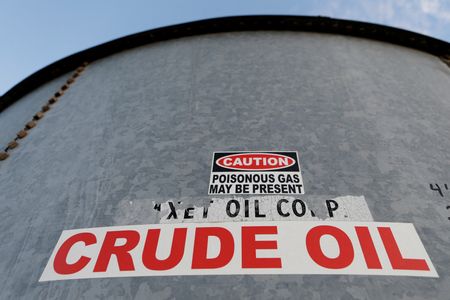
By Rowena Edwards
LONDON (Reuters) – Oil prices fell in volatile trade on Tuesday as the market balanced impending European Union sanctions on Russian oil with demand concerns related to coronavirus lockdowns in China, a strong dollar and growing recession risks.
Brent crude was down 69 cents, or 0.6%, at $105.25 a barrel at 1233 GMT, while U.S. West Texas Intermediate crude fell 45 cents, or 0.4%, to $102.64 a barrel.
Both contracts fell by more than $2 per barrel earlier in the session.
“The combination of COVID-related lockdowns in China and worldwide interest rate increases to battle inflation put equity investors on the back foot, strengthened the dollar and significantly raised concerns of economic slowdown,” said Tamas Varga of oil broker PVM.
The dollar held near 20-year highs, making oil more expensive for holders of other currencies. [MKTS/GLOB]
The latest data showed China’s export growth had slowed to single digits, their weakest in almost two years, as the country extended lockdowns.
Financial markets are also heeding concerns that some European economies could suffer distress if Russian oil imports were curtailed further, or if Russia retaliated by cutting off gas supplies.
German officials are quietly preparing for any sudden halt in Russian gas supplies, Reuters reported. A halt would trigger a deep recession and cost half a million jobs, a senior economist said in an interview published on Tuesday.
In the United States, crude, distillates and gasoline inventories likely fell last week, a preliminary Reuters poll of weekly data showed on Monday. [EIA/S]
“Oil markets do look like they have more room to fall in the shorter term,” said Jeffrey Halley, a senior market analyst at OANDA.
Delays to the EU Commission’s proposal to ban oil imports from Russia have also weighed on futures prices.
But French European Affairs Minister Clement Beaune said on Tuesday that EU members could reach a deal this week on Russian oil sanctions.
French President Emmanuel Macron spoke over the phone to Hungary’s Prime Minister Viktor Orban aiming to finalise the European Union’s proposal to ban all Russian oil imports, part of a sixth package of sanctions aimed at Russia, the presidential palace said on Tuesday.
Among the 27 EU member states, Hungary is the most vocal critic of the planned embargo on Russian oil.
In addition to the recent G7 gradual import ban on Russian oil, Japan, which obtained 4% of its oil imports from Russia last year, has agreed to phase out its Russian oil purchases.
Brent and WTI futures rose by over $1 per barrel earlier in the session following bearish comments from the Saudi and UAE energy ministers.
(Additional reporting by Florence Tan in Singapore and Laura Sanicola in New York; editing by Jason Neely)

